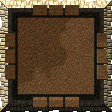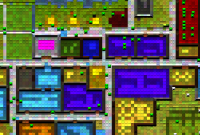Building: Difference between revisions
No edit summary |
No edit summary |
||
| Line 1: | Line 1: | ||
{{Construction}} | {{Construction}} | ||
[[File:building_icon.png|left]][[File:generic_building_preview.png|right]]'''Buildings''' are structures made by the [[citizens]] of a player's [[settlement]]. Each building requires a certain number of [[resources]] to fully complete. When selecting a building, the player must select its size by clicking and dragging anywhere in the [[world]]. After this, the citizens will begin building by allocating the necessary resources by placing them in the area of where the building will be; this means the building process will be paused if there's not enough resources to build it. After this, the actual construction will be performed. | [[File:building_icon.png|left]][[File:generic_building_preview.png|right]]'''Buildings''' are structures made by the [[citizens]] of a player's [[settlement]]. Each building requires a certain number of [[resources]] to fully complete. Some buildings must be unlocked by [[knowledge]] points. When selecting a building, the player must select its size by clicking and dragging anywhere in the [[world]]. After this, the citizens will begin building by allocating the necessary resources by placing them in the area of where the building will be; this means the building process will be paused if there's not enough resources to build it. After this, the actual construction will be performed. | ||
There must always be citizens [[Odd_jobber|free of doing other tasks]] to make time for constructing buildings. Some buildings require additional [[components]] to build - with some being necessary and some optional. There is a unique mechanic in the game where the shape of a building pleases specific races. There are two ways a building shape can be made: square and organic. Square is self-explanatory, while organic refers to unnatural or round shapes. It is possible to split the difference and do a fraction of both, therefore mildly pleasing everyone. There are many measurable factors for buildings: [[degrade]], [[rate]], [[isolation]], [[workload]], [[radius]] and [[capacity]]. | There must always be citizens [[Odd_jobber|free of doing other tasks]] to make time for constructing buildings. Some buildings require additional [[components]] to build - with some being necessary and some optional. There is a unique mechanic in the game where the shape of a building pleases specific races. There are two ways a building shape can be made: square and organic. Square is self-explanatory, while organic refers to unnatural or round shapes. It is possible to split the difference and do a fraction of both, therefore mildly pleasing everyone. There are many measurable factors for buildings: [[degrade]], [[rate]], [[isolation]], [[workload]], [[radius]] and [[capacity]]. | ||
Revision as of 23:54, 28 May 2021


Buildings are structures made by the citizens of a player's settlement. Each building requires a certain number of resources to fully complete. Some buildings must be unlocked by knowledge points. When selecting a building, the player must select its size by clicking and dragging anywhere in the world. After this, the citizens will begin building by allocating the necessary resources by placing them in the area of where the building will be; this means the building process will be paused if there's not enough resources to build it. After this, the actual construction will be performed.
There must always be citizens free of doing other tasks to make time for constructing buildings. Some buildings require additional components to build - with some being necessary and some optional. There is a unique mechanic in the game where the shape of a building pleases specific races. There are two ways a building shape can be made: square and organic. Square is self-explanatory, while organic refers to unnatural or round shapes. It is possible to split the difference and do a fraction of both, therefore mildly pleasing everyone. There are many measurable factors for buildings: degrade, rate, isolation, workload, radius and capacity.
Each building serves a unique and helpful purpose for a settlement, but most are where employees work to make certain resources. Some buildings may not be a building in the traditional sense, in that some may not necessarily contain a floor, walls or a roof, but some may be in the form of an open area, like a graveyard or pasture. Almost all buildings require a doorway for access, and having an actual door for the doorway is optional. Some buildings may be in tiers; in other words, some buildings may do roughly the same thing, but better than others, with the trade-off being that the better buildings are more resource-expensive to build and might be harder to manage, but produce the best type of resource or pleasure for everyone.
There are two ways of buildings, which come in different menus in the game: The first, and arguably most practical way is to select a building that's meant for producing a resource or service for the city. The second way is to build a generic wood, stone or grand building, which will be empty when built, but can be repurposed for anything afterward. Buildings must always be maintained by janitors: people who are employed to keep constructs from degrading.

When designing a building that's very large, it will incur extra expenses. This can be rectified by redesigning the building in a way where supports/pillars are put in place. When removing buildings, some of them must be deconstructed over time, leaving behind some resources that were used to make the building. Some buildings will vanish instantly, leaving behind nothing, unless resources were being stored there. When zoomed-out far enough, building interiors will appear in different colors.
Buildings can also be built on shallow water, although this adds extra time in construction. Citizens must clear out the water before beginning the actual construction. The way water is cleared away is similar to the Remove Water command.
Workforce

Buildings that require employees will have an option for the player to choose how many employees will work there. However, there's also an "Auto Employ" option, which automatically leaves the game to decide how many employees will work there depending on how much work is needed. There are pros and cons in both manually choosing employee amounts and the "Auto Employ" option. Manually choosing employees can allow high numbers of citizens working to get things done quicker, but this runs the risk of having employee potential wasted, because the extra employees hired could have been working elsewhere.
The "Auto Employ" option is - as one could have easily figured out, and as previously stated - good for having the game manage employees for you, leaving one less task for the player to micromanage. The issue with this is that the game might auto-hire employees in amounts that the player might not agree with, or in inefficient numbers. In other words, the game might automatically hire a certain amount of employees that aren't getting the job done as much as manually choosing employees would have.
Priorities for certain races of citizens can be set, meaning that the player can have people working to their strengths. If these priorities aren't set, the game will randomly choose people to work jobs at random. For example, it would be wise to have Cretonians working on farms and Dondorians working on ore mines, as they would be working on what those races of people are good at.
Buildings list
There are 11 categories of buildings, and 61 types of buildings among them, including The Throne.
Categories:
- Infrastructure
- Extraction
- Agriculture
- Refiners
- Workshops
- Food
- Military
- Law
- Knowledge
- Service
- Afterlife
Buildings:
- Throne (already built, but can be moved)
- Warehouse
- Trade Depot
- Delivery Depot
- Hauler
- Janitor
- Builder
- Outpost
- Monument
- Torch
- Hearth
- Woodcutter
- Claypit
- Coal Mine
- Gem Mine
- Ore Mine
- Sithilon Mine
- Stone Mine
- Fishery
- Hunter
- Cannibal
- Cotton Farm
- Fruit Farm
- Grain Farm
- Mushroom Farm
- Vegetable Farm
- Auroch Pasture
- Entelodont Pasture
- Onx Pasture
- Bakery
- Distillery
- Grain Brewery
- Charcoaler
- Metal Smelter
- Weaver
- Carpenter
- Jeweller
- Masonry
- Papermaker
- Pottery
- Textile Tailor
- Leather Tailor
- Tool Smithy
- Weapon Smithy
- Canteen
- Eatery
- Tavern
- Training Ground
- Guardpost
- Dungeon
- Scaffolds
- Slaver
- Court
- Library
- Flat House
- Dormitory
- Chamber
- Bathhouse
- Well
- Lavatory
- Mass Grave
- Graveyard
- Crypt